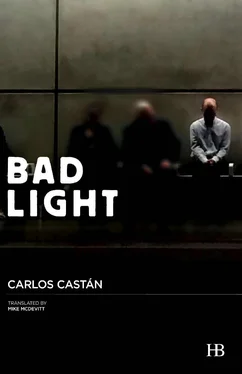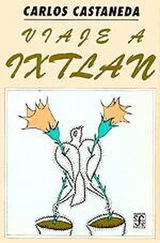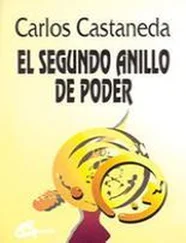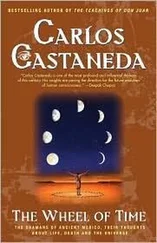Carlos Castán - Bad Light
Здесь есть возможность читать онлайн «Carlos Castán - Bad Light» весь текст электронной книги совершенно бесплатно (целиком полную версию без сокращений). В некоторых случаях можно слушать аудио, скачать через торрент в формате fb2 и присутствует краткое содержание. Год выпуска: 2016, Издательство: Hispabooks, Жанр: Современная проза, на английском языке. Описание произведения, (предисловие) а так же отзывы посетителей доступны на портале библиотеки ЛибКат.
- Название:Bad Light
- Автор:
- Издательство:Hispabooks
- Жанр:
- Год:2016
- ISBN:нет данных
- Рейтинг книги:5 / 5. Голосов: 1
-
Избранное:Добавить в избранное
- Отзывы:
-
Ваша оценка:
- 100
- 1
- 2
- 3
- 4
- 5
Bad Light: краткое содержание, описание и аннотация
Предлагаем к чтению аннотацию, описание, краткое содержание или предисловие (зависит от того, что написал сам автор книги «Bad Light»). Если вы не нашли необходимую информацию о книге — напишите в комментариях, мы постараемся отыскать её.
Carlos Castán
Bad Light
Bad Light — читать онлайн бесплатно полную книгу (весь текст) целиком
Ниже представлен текст книги, разбитый по страницам. Система сохранения места последней прочитанной страницы, позволяет с удобством читать онлайн бесплатно книгу «Bad Light», без необходимости каждый раз заново искать на чём Вы остановились. Поставьте закладку, и сможете в любой момент перейти на страницу, на которой закончили чтение.
Интервал:
Закладка:
17 (intimacy)
Nadia arrived at our meeting ten minutes late. I don’t know why, but I’d assumed she’d turn up much later. I positioned myself in the bar next to one of the windows, so as to be able to see her as she appeared around the street corner. As I watched her approach, I wondered what it might be like to miss her. In other words, what it might be like to have loved her dearly, for a long time, only for her then to have left.
In the flesh, she looked slightly plumper than in her photos. Pretty, either way, with extremely close-cropped blonde hair, à la Jean Seberg, and very dark skin. It wasn’t until after talking to her for a few minutes, with her observing you from very close quarters, that you could truly appreciate her allure. She had that trait, such a hard one to come by, that can make a man lose his head and drive him to perdition in record time. By which I mean a sort of contrast, a contradiction even, between the eyes and the mouth. While the gaze is a gentle combination of innocence and melancholy, the lips, just a few inches further down, slightly parted, summon forth the wildest of desires. Not everyone can see it. I have rarely come across such a clear-cut case. Marilyn Monroe, perhaps, in certain photos. Not in every one, that’s for sure. But there are some in which, if you cover the entire image with your hands aside from the eyes, you are left with the gaze of someone pleading for protection and tenderness, perhaps even consolation. And if you then do the same, but this time leaving only the mouth in view, what you get is a fragment of a photograph with which any teenager could happily lock himself away in the bathroom to go about his business. When she spoke, depending on which phoneme she was uttering, you could see the tip of Nadia’s tongue. Without realizing it, she promised everything when she spoke.
I filled her in on how the past few days had been for me — the extent of Jacobo’s terror the last night I went to keep him company, his fear, for the first time, not of the waves of anguish to which he had more or less become accustomed, insofar as anyone can get used to such a thing, but rather of human beings to be fended off with knives and blunt objects. I explained how unhinged the whole business had left me, how, out of instinct, I had begun by searching his apartment and had ended up combing my own place, which I had been unable ever since to see as anything other than a dead man’s home. I told her how, in the wake of the murder, I had become a stranger among my own things, that sense of having outlived myself, transformed into a shadow, and how I had assumed the role of a nosy relative who prizes open drawers and breaks padlocks, who fingers sacred objects and ends up reading letters that were not meant for his eyes, looking at photos of himself as if they were showing him the face of a stranger, keenly studying the passages underlined in books, sorting through bills, train tickets, coasters, receipts of every kind, and programs for theaters that have long since ceased to exist.
She told me she hadn’t been in Zaragoza for long. She said she’d gotten separated a couple of years back and had ever since been looking to make a clean break. She had, quite literally, had a makeover; she’d even chosen a new name. She also said that she’d been hoping to move but was not sure where to or when, she was still at that stage where you dream of impossible houses hugging the sea, with a porch and plants creeping up freshly whitewashed walls. She added that she wasn’t cut out for the single life. As for Jacobo, it was clear that she preferred not to go into too much detail. Truth be told, she didn’t wish to go into too much detail about anything. It was as if she were striving to make everything she said sound banal. The first time they met, Jacobo had insisted that she read The War by Marguerite Duras. They had arranged to meet so that he could lend her his copy then made another date to discuss the book. It puzzled Nadia how anyone could become so obsessed over a story that, as she saw it, was like so many others. “Like so many others,” that’s how she put it. They became lovers. It’s not as if they saw much of one another. Nor did they have a shared future mapped out or plans of any kind. They simply called each other from time to time whenever either of them felt loneliness beginning to bite, a feeling, as anyone will tell you, that tends to wax and wane. They cooked meals for each other, sampled new wines, and then went to bed, usually somewhat tipsy. At this point, Nadia’s gestures take on a coy air that I do not fully buy. There are no observations, no details. She averts her gaze, seeking refuge in a short pause in order to take another sip of her coffee, only her cup is already empty.
All of a sudden, she tells me she’d like to go to Jacobo’s apartment. She asks if I’ve got the keys on me.
“Well, no, I don’t have the keys on me.”
“I do. Here, in my bag.”
“Right, then you can go any time.”
“Not alone.”
“Perhaps you’ve already been.”
“No. I can’t bring myself to go alone, I told you. I’d like you to come with me now. It’ll only take a couple of minutes.”
“Are you sure? You might find it painful.”
“I need that pain. I feel like ice, right now, and I can’t stand it. I just want to be there for a moment, to take a quick look around, to remember the smells. Then tonight, when I go to bed, I’ll try to break down in tears. That’s the idea.”
Once inside the apartment, she began to make her way very slowly from room to room, peering out the window several times. She barely paused in the part of the entryway where the events had taken place, nor did she glance for more than a second or two at the stains of blood encrusted on the stippled wall. Then she lit a cigarette and sat down on one end of the couch. I guess that must have been her spot when they settled in to watch a movie or chat for a while. She wanted a drink. I fixed her a whisky with a couple of ice cubes that smelled a little, it seemed to me, of the hake fillets that had lain next to them in the freezer. Glass in hand, she got up again and headed, very slowly, for the bedroom. There was something robotic in her movements, her gaze did not settle on anything in particular, and yet at the same time it was as if she were scanning everything, before processing it all in the most neutral fashion. She came to a halt, standing before the bed that was now home only to one of the those standard-issue blue mattresses, without a bedspread, that bore, in the form of stains and patches, the traces of all of the apartment’s former tenants over time, circles of saliva, sweat, semen, piss, and blood, all the warmth of human intimacy. There, looking at that deformed, empty mattress, she began to cry softly. The statue came to life in its white dress. “Son of a bitch,” she said. I went to fetch a wad of toilet paper and handed it to her by way of a handkerchief. Then, finger by finger, I prized the glass from her grip to prevent it from shattering under the pressure, before placing it on the bedside table. I was just about to say something about how dreadful the moment was and how beautiful she looked, crying at the foot of that bed, wearing the very sandals she was buckling in the photo, without knowing where to tap the ash from the cigarette she held between her fingers or what to do with that sudden stab of pain or where to direct all the desire that sprang from her, perverse and unwelcome, as she looked at that furniture and that light. I was just about to ruin it all with words, but I held back. I simply walked over to where she stood and embraced her from behind, almost recklessly. I could tell that she was thankful, so I hugged her to me. She titled her head back, feeling for me. She also thrust her ass out, feeling for me yet more and without altogether stopping from crying. Snatches of a tango sung by good old Roberto Goyeneche— qué me importa perderme mil veces la vida —drifted through the inner patio from some distant radio. And we fell onto the unmade bed just as the first rumblings of a storm that threatened to take with it in a matter of seconds the little evening light that remained could be heard on the other side of the window, and everything was strange and bitter and stunningly beautiful, the white dress on the dried-out filth, my tongue amongst her tears, the pleasure, the anguish, the sobs. Afterward, we lay there a good long while, naked and in silence, very still, watching as the darkness took possession of the dead man’s room and listening to the sounds that drifted up from the street, the drip-drip of drainpipes and cornices, the motorcycles driving past, the noise of tires on wet asphalt. And then I think Nadia hit the right note. I will never know how she knew, or what dark magic moved her tongue, but she rested her head on my shoulder, and I’d swear she said what is to become of us ? And I knew then that I would die calling out her name, and also that she would not come.
Читать дальшеИнтервал:
Закладка:
Похожие книги на «Bad Light»
Представляем Вашему вниманию похожие книги на «Bad Light» списком для выбора. Мы отобрали схожую по названию и смыслу литературу в надежде предоставить читателям больше вариантов отыскать новые, интересные, ещё непрочитанные произведения.
Обсуждение, отзывы о книге «Bad Light» и просто собственные мнения читателей. Оставьте ваши комментарии, напишите, что Вы думаете о произведении, его смысле или главных героях. Укажите что конкретно понравилось, а что нет, и почему Вы так считаете.












